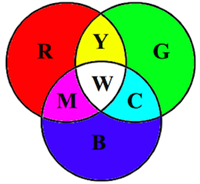
|
Color Subtraction and Primary Pigments:
Primary pigments are painted onto or fixed within objects to subtract (absorb) one or more of the three primary colors of light. Any light color that shines on the paper and is not subtracted (absorbed) becomes reflected. This reflected light contributes to the color appearance of the object.
|

|
 Many students of physics have seen a diagram similar to the one shown at the right. The diagram depicts three circles colored with the primary colors of light - red, green and blue. The primary colored circles overlap to produce other colors of light, known as the secondary colors of light: cyan (C), magenta (M) and yellow (Y). These three colors - C, M, Y - are also the three primary colors of paint. The colors of light that they absorb are those directly opposite them on the color wheel. Cyan pigment absorbs red light. Magenta pigment absorbs green light. And yellow pigment absorbs blue light. Many students of physics have seen a diagram similar to the one shown at the right. The diagram depicts three circles colored with the primary colors of light - red, green and blue. The primary colored circles overlap to produce other colors of light, known as the secondary colors of light: cyan (C), magenta (M) and yellow (Y). These three colors - C, M, Y - are also the three primary colors of paint. The colors of light that they absorb are those directly opposite them on the color wheel. Cyan pigment absorbs red light. Magenta pigment absorbs green light. And yellow pigment absorbs blue light.
|

|
The first sentence contains two parts. Each part describes how a shirt appears in the presence of a particular color of light. You will need to analyze each part carefully and thoughtfully. The thinking becomes complicated; don't rely on your memory - write down what you conclude from each analysis. Your thinking should proceed as follows:
In each part of the first sentence, two primary colors of light shine on the paper; you will need to first determine which two light colors they are. (Use the color wheel in the Dig That Diagram section if necessary.) If the shirt appears black, then both of those light colors were absorbed. Two primary pigments are needed to absorb both light colors. Use the Dig That Diagram section to determine which pigment they are. On the other hand, if the shirt appears a particular color, then one of the light colors is reflected; the other light color is absorbed. One primary pigment is in the shirt absorbing that light color. Use the Dig That Diagram section to determine which pigment that is. Write down the pigment color(s), take a deep breath and repeat the process for the second part of the first sentence.
|